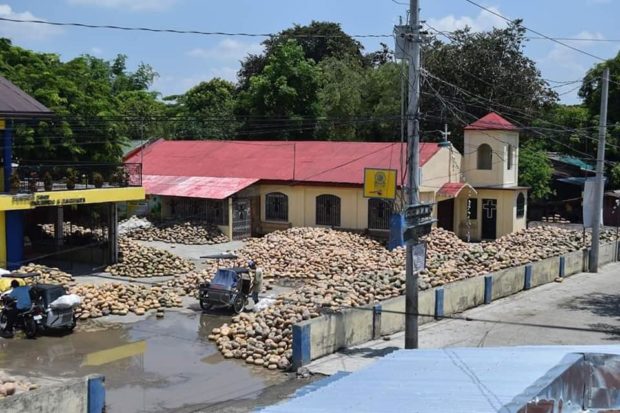
An abundant supply of squashes situated outside a church in Zaragoza town, Nueva Ecija. Image: courtesy of Lotlot Rose/Facebook
The local government of Zaragoza in Nueva Ecija, together with its townspeople, have been helping the local farmers of Brgy. Batitang, to ensure that they would still earn a living amid the ongoing community quarantine due to the COVID-19 pandemic.
Photos of an abundant supply of squash (kalabasa) circulated on social media last week when residents and local officials of Zaragoza, led by its mayor Efren Nieves, halted motorists and passersby to hand them free squash.
“May nanghaharang [opisyal] sa harap ng aming munisipyo [sa] Zaragoza. Hindi para manita ng mga dumaraan [kundi] para mamigay ng libreng kalabasa para sa lahat,” read the post of netizen Marisel Esteban Galutan on Facebook, on May 12.
(Officials are blocking motorists in front of our municipal hall [in] Zaragoza, not to accost them but to give away free squash to everyone.)
According to Galutan, their local government unit has already distributed some relief goods for them which include the local farmers’ produce, except in Brgy. Batitang where all the squash are coming from.
Galutan, who is also a farmer’s daughter, told INQUIRER.net that they appreciate the local government’s effort to help local farmers in this time of need.
“Sa ngayon po, nakapagbigay na po sila ng binhi para sa pagpapasimula ulit ng sakahan. Meron na rin pong ilan sa aming kababaryo ang nabigyan ng P5,000 cash assistance from the Department of Agriculture at kasalukuyan pong pino-process ‘yung ibang hindi pa nakakatanggap,” she said.
(So far, they have already given some seedlings to restart planting on the farms. There are also some villagers who have been given P5,000 cash assistance by the Department of Agriculture. The rest [of the aid] is being processed for those who have not yet received.)
The Zaragoza Municipal Disaster Risk Reduction and Management Office (MDRRMO) also posted on its Facebook page some shots of the squash collected under a tent in front of the municipal hall.
Another netizen, Marivic Daga Siggaoat Abare, also showed images of the squash harvested by her sister who is a squash farmer. She also called for possible buyers to place orders, so their family could recover the cost from farming.
“Ang nakakalungkot po nito, dahil lockdown, walang buyer, hindi po maibenta,” she stated in her post. (Unfortunately, due to the lockdown, there are no buyers and we could not sell the produce.)
Fortunately, with the help of the religious organization “Ako ang Saklay,” Fr. Arnold Abelardo has been coordinating with the local government of Zaragoza to help sell and distribute the squash to poor families, orphanages in San Jose town, members of the organization, and missionary homes and seminaries in Quezon City.
‘The Kalabasa Project’
Meanwhile, Kay Jonatas, a 32-year-old pharmacist turned “FARM-assist” in Zaragoza, Nueva Ecija spearheaded “The Kalabasa Project” as she also aims to extend her help to the local farmers of their province.
Jonatas came from a family of farmers as well, and her mother owns an agricultural machinery parts supply. They have been working with various local farmers for years and said that they know how much time farmers spend on the land.
In an interview with INQUIRER.net, Jonatas shared that she came up with the initiative one day when she witnessed their local government officials giving away the fruits to passersby. She wondered where the overflowing supply of the vegetables came from. Her mother informed her that the produce was from Batitang.
“[My] mom’s employee was [also] from that place [so] I immediately called her [and] asked how can I help,” Jonatas recalled. “Then she began crying on the phone since because of the lockdown, she [has not been able to] report to work, so she only sold her husband’s harvested [squash for] 2 pesos per kilo.”
Jonatas thought that the very low cost of P2 per kilo of squash is unfair to the farmers. This led her to organize “The Kalabasa Project” via her Facebook account. She has been working on the initiative together with her friend Ellah Yuki, in charge of the arrangements with prospective buyers.
Since they started the initiative on May 12, they had already distributed around 47,000 kilos of squash amounting to P304,000. Their sponsors are from different areas including Bulacan, Tarlac, Metro Manila and Pampanga, where most of the produce were being distributed as relief goods.
They also have been allocating some supplies of squash for the inmates of Quezon City Jail and of the National Bilibid Prison in Muntinlupa City, as well as to churches, hospitals, orphanages, and animal rescue centers.
Jonatas continues to call for help from people who may have contacts with other LGUs and non-governmental organizations for referrals.
As of May 13, the current inventory of the fruits is at 100,000 kilos. Jonatas is concerned that these may start to rot if not distributed as soon as possible.
On May 15, she posted an update on her Facebook account, stating that they were able to help four farmers with one bulk order (6,000 kilos) of squash; orders were from private individuals who will be donating the squash to city jails.
For those who would like to purchase squash from the project, more details can be found on her post. JB
RELATED STORIES:
In Benguet, farmers donate carrots, church workers raise funds in continued COVID-19 fight
Bicol family uses quarantine time for planting, gives away vegetables to neighbors
Bocaue LGU buys fresh produce from Cordillera farmers, fish vendors for relief distribution